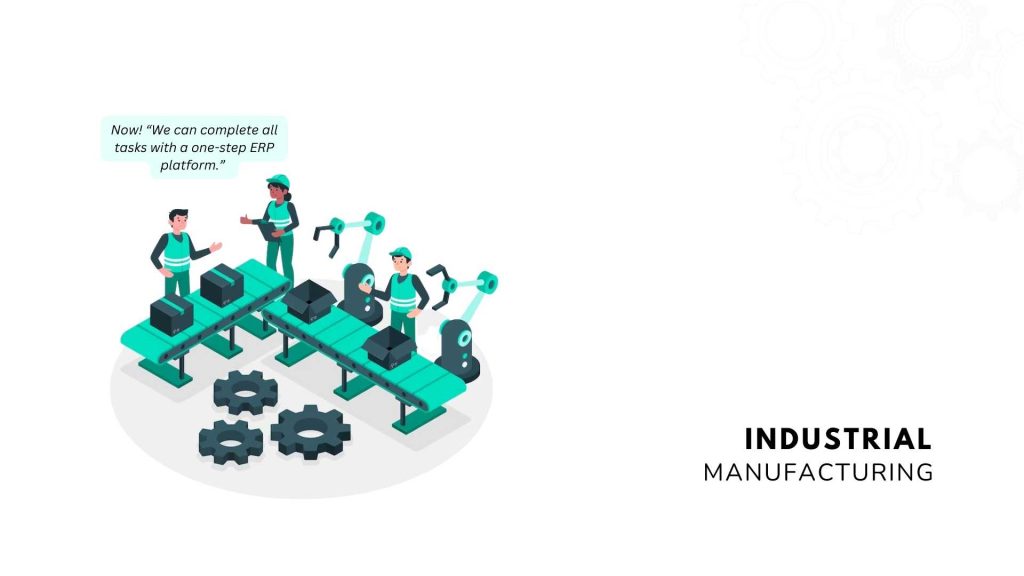In industrial manufacturing: efficiency, accuracy, and agility are paramount. ERP is a key technology that has revolutionized industrial manufacturers’ operations. We will delve into the intricacies of ERP for industrial manufacturing, exploring its definition, target audience, benefits, haste of implementation, building a business case, and the merits of choosing the right ERP for this sector.
What Is ERP for Industrial Manufacturing?
ERP is a complete software solution that organizes core business operations across an organization. ERP goes beyond traditional business functions in industrial manufacturing and is designed to streamline and optimize the entire manufacturing process.
It encompasses modules that handle various aspects such as production planning, inventory management, supply chain, customer relationship management (CRM), financials, Etc. ERP for industrial manufacturing provides a unified platform for managing and coordinating diverse operations within a manufacturing enterprise.
Who Is Industrial Manufacturing ERP Software For?
Industrial Manufacturing ERP software is tailored for businesses involved in the production of physical goods. It includes companies manufacturing machinery, equipment, electronics, automobiles, aerospace components, Etc.
Whether it’s discrete manufacturing or process manufacturing, ERP caters to the unique needs of the industrial manufacturing sector. It is ideal for businesses of varying sizes, from SMEs to large-scale manufacturing conglomerates.
What Are the Uses of Investing in ERP for Industrial Manufacturing?
Improved Efficiency and Productivity: ERP systems automate and optimize key processes, reducing manual interventions and minimizing errors. It increases operational efficiency and productivity gains as tasks are streamlined and executed seamlessly.
Enhanced Visibility and Control: With real-time data analytics and reporting capabilities, industrial manufacturers gain unparalleled visibility into their operations. It enables better decision-making, inventory management, and resource allocation, enhancing control over the manufacturing process.
Integrated Supply Chain Management: Industrial Manufacturing ERP facilitates end-to-end supply chain integration, from procurement to production and distribution. It ensures a synchronized flow of materials and information, reducing lead times and improving overall supply chain efficiency.
Regulatory Compliance: Adherence to industry regulations and compliance standards is critical in manufacturing. ERP systems help automate compliance processes, ensuring that all operations meet regulatory requirements, thereby minimizing non-compliance risk.
Customer Relationship Management (CRM): Industrial Manufacturing ERP includes CRM functionalities, enabling manufacturers to manage customer interactions, track orders, and provide better customer service. It leads to enhanced customer happiness.
Why Does Your Industrial Manufacturing ERP Solution?
The dynamic nature of the industrial manufacturing landscape demands agility and adaptability. Here are compelling reasons why implementing an ERP solution is crucial for your business now:
Global Competition: In a globalized market, industrial manufacturers face intense competition. ERP systems provide the tools to enhance competitiveness by optimizing operations, reducing costs, and improving overall efficiency.
Evolving Customer Expectations: Customers today demand faster delivery, customization options, and high-quality products. ERP systems enable manufacturers to respond swiftly to changing customer preferences, ensuring customer satisfaction and loyalty.
Technological Advancements: Embracing the latest technological advancements is imperative for staying ahead in the manufacturing industry. ERP solutions leverage emerging technologies such as AI, machine learning, and the IoT, keeping manufacturers at the forefront of innovation.
How Can We Create a Strong Business Case?
Building a compelling business case is crucial for garnering support and securing resources for an ERP implementation. Here are key steps to create a robust business case:
Identify Pain Points: Clearly outline the existing challenges and pain points within your manufacturing processes. It could include issues related to inventory management, production delays, data inaccuracies, or communication gaps.
Define Objectives: Establish specific objectives that an ERP solution can address. Whether it’s reducing lead times, improving resource utilization, or enhancing customer satisfaction, clearly articulate the goals of the ERP implementation.
Quantify Benefits: Quantify the expected cost savings, efficiency gains, and improved performance benefits. Use data and metrics to demonstrate how the ERP system will contribute to the organization’s success.
Assess Risks: Acknowledge and assess potential risks associated with ERP implementation. Develop a risk mitigation plan to address challenges and ensure a smoother transition.
ROI Analysis: Conduct a comprehensive Return on Investment (ROI) analysis to showcase the financial benefits of the ERP implementation. It includes evaluating tangible and intangible benefits over the short and long term.
Why Choose Acumatica ERP for Industrial Manufacturing?
Selecting the right ERP solution is crucial for the success of your implementation. Acumatica ERP stands out as a robust and flexible choice for industrial manufacturing for several reasons:
Cloud-Based Flexibility: Acumatica ERP is a cloud-based solution offering unparalleled flexibility and scalability. It ensures that your manufacturing operations can adapt to changing business needs and scale as your business grows.
Comprehensive Functionality: Acumatica ERP provides a comprehensive set of functionalities specifically designed for industrial manufacturing. From production planning to supply chain management, Acumatica covers all aspects of the manufacturing process.
Real-Time Insights: With Acumatica, manufacturers gain real-time insights into their operations through advanced analytics and reporting tools. It enables data-driven decision-making and a proactive approach to managing manufacturing processes.
User-Friendly Interface: The user-friendly interface of Acumatica ERP ensures that your company team can quickly adjust to the new system. Intuitive navigation and a well-designed interface contribute to a smoother implementation process.
Customization Capabilities: Every manufacturing business is unique, and Acumatica understands this. The platform offers robust customization capabilities, allowing you to tailor the ERP system to meet your industrial manufacturing operations’ specific needs and workflows.
In conclusion, implementing ERP for industrial manufacturing is a strategic move that can significantly enhance efficiency, agility, and competitiveness. Acumatica ERP, with its cloud-based flexibility, comprehensive functionality, real-time insights, user-friendly interface, and customization capabilities, emerges as a top choice for manufacturers seeking a reliable and adaptable solution.
By understanding the key aspects of ERP implementation and its benefits to industrial manufacturing, businesses can embark on a transformative journey toward operational excellence and sustained growth.

Vijay comes with a vast experience in ERP and enterprise solutions space with about 20 years of experience in various packaged application like Acumatica, SAP, Orion, Salesforce.com, SugarCRM and, SalesLogix.

